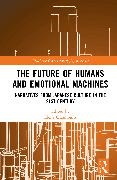Read more
This book explores human-machine interaction in Japan, providing a new focus on how and in what form people build affective bonds to new technologies.
List of contents
1. Introduction: Astro Boy's Grandchildren-Tales of Longing, Disappointment, and New Heroes in Japan
Part 1: The Family Album of Emotional Machines: Pepper and His Successors 2. Representations of Emotional Capacity in Human-Robot Interaction: From Astro Boy to Pepper 3. Character, Desire, Infrastructure: Manga/Anime Fandom Preceding and Predicting Technological Experimentation in Japan 4. Characteristics of Artificial Intelligence in Japan
Part 2: Between Promises and Realities: A Critique of Popular Media and Public Narrative 5. Hearts Meet Wires: Navigating the Ethical and Social Implications of Care Robotics 6. On Posthuman Imaginaries and Japanese Robot Culture: A Techno-Oriental Strand of Cruel Optimism 7. Human-Machine Relations from Abacus to AI in the Sanrio anime
Aggressive Retsuko (
Aggretsuko) 8. An Anthropological View of Social Robots: Ontological Indefiniteness and the Subjective Experience of Care Technologies in Japan
Part 3: Inheriting Human Problems: Negotiating Dreams, Fears, and Gender 9.
Kawaii Aesthetics in Human-Machine Romance: Reimagining Gender, Cuteness, and Digital Intimacy in
A.I. Love You (2016) 10. Reframing Socio-Cultural Malaise in the Technocene: A Psychosocial Reading of K¿b¿ Abe's
Inter Ice Age 4 and Kazuo Ishiguro's
Klara and the Sun Part 4: Blurring Boundaries: Where Does the Human End, Where Does the Machine Begin? 11. Beyond an Ontological Divide: Possibilities of Emotional Connections between Humans and Androids in Sh¿k¿ Murase's Anime
Ergo Proxy 12. The Obsolescence of Robot Commodity and Human-Machine Relationship: The Case of Two Anime 13. OriHime Robot Avatars, Affect, and Performance
Digression 1: Artistic Visions on Human-Machine Attachments 14. My Robot, Blurting Out (translated by Jeffrey Angles) 15. Humans and AI humans-On Ambiguity and Change
Digression 2: The Impact of the Popular Imaginary on Robotics Engineering in Japan 16. "We can expect the relationship between humans and robots to be of a different kind from that between humans"-An interview with
Tatsuya Nomura 17. "Behavior that complements humans is an essential characteristic of social agents"-An interview with
Hirotaka ¿sawa 18. "By creating communication robots, I would like to ensure that there are no people who feel socially isolated"-An interview with
Hidenobu Sumioka
About the author
Elena Giannoulis is Professor of Japanese Literature at the Department of History and Cultural Studies at the Freie Universität Berlin, Germany.

